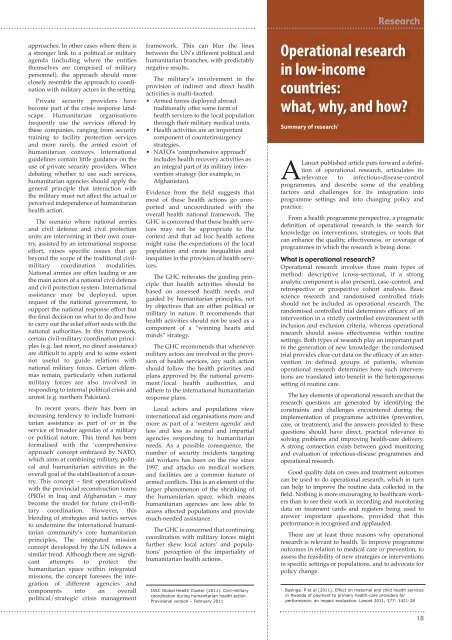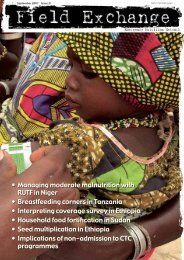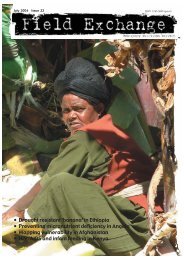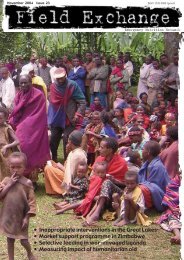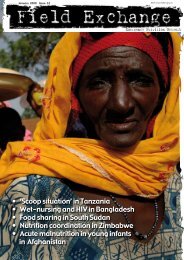Download a PDF of this issue - Field Exchange - Emergency ...
Download a PDF of this issue - Field Exchange - Emergency ...
Download a PDF of this issue - Field Exchange - Emergency ...
You also want an ePaper? Increase the reach of your titles
YUMPU automatically turns print PDFs into web optimized ePapers that Google loves.
approaches. In other cases where there is<br />
a stronger link to a political or military<br />
agenda (including where the entities<br />
themselves are comprised <strong>of</strong> military<br />
personnel), the approach should more<br />
closely resemble the approach to coordination<br />
with military actors in the setting.<br />
Private security providers have<br />
become part <strong>of</strong> the crisis response landscape.<br />
Humanitarian organisations<br />
frequently use the services <strong>of</strong>fered by<br />
these companies, ranging from security<br />
training to facility protection services<br />
and more rarely, the armed escort <strong>of</strong><br />
humanitarian convoys. International<br />
guidelines contain little guidance on the<br />
use <strong>of</strong> private security providers. When<br />
debating whether to use such services,<br />
humanitarian agencies should apply the<br />
general principle that interaction with<br />
the military must not affect the actual or<br />
perceived independence <strong>of</strong> humanitarian<br />
health action.<br />
The scenario where national armies<br />
and civil defence and civil protection<br />
units are intervening in their own country,<br />
assisted by an international response<br />
effort, raises specific <strong>issue</strong>s that go<br />
beyond the scope <strong>of</strong> the traditional civilmilitary<br />
coordination modalities.<br />
National armies are <strong>of</strong>ten leading or are<br />
the main actors <strong>of</strong> a national civil defence<br />
and civil protection system. International<br />
assistance may be deployed, upon<br />
request <strong>of</strong> the national government, to<br />
support the national response effort but<br />
the final decision on what to do and how<br />
to carry out the relief effort rests with the<br />
national authorities. In <strong>this</strong> framework,<br />
certain civil-military coordination principles<br />
(e.g. last resort, no direct assistance)<br />
are difficult to apply and to some extent<br />
not useful to guide relations with<br />
national military forces. Certain dilemmas<br />
remain, particularly when national<br />
military forces are also involved in<br />
responding to internal political crisis and<br />
unrest (e.g. northern Pakistan).<br />
In recent years, there has been an<br />
increasing tendency to include humanitarian<br />
assistance as part <strong>of</strong> or in the<br />
service <strong>of</strong> broader agendas <strong>of</strong> a military<br />
or political nature. This trend has been<br />
formalised with the ‘comprehensive<br />
approach’ concept embraced by NATO,<br />
which aims at combining military, political<br />
and humanitarian activities in the<br />
overall goal <strong>of</strong> the stabilisation <strong>of</strong> a country.<br />
This concept – first operationalised<br />
with the provincial reconstruction teams<br />
(PRTs) in Iraq and Afghanistan – may<br />
become the model for future civil-military<br />
coordination. However, <strong>this</strong><br />
blending <strong>of</strong> strategies and tactics serves<br />
to undermine the international humanitarian<br />
community’s core humanitarian<br />
principles. The integrated mission<br />
concept developed by the UN follows a<br />
similar trend. Although there are significant<br />
attempts to protect the<br />
humanitarian space within integrated<br />
missions, the concept foresees the integration<br />
<strong>of</strong> different agencies and<br />
components into an overall<br />
political/strategic crisis management<br />
framework. This can blur the lines<br />
between the UN’s different political and<br />
humanitarian branches, with predictably<br />
negative results.<br />
The military’s involvement in the<br />
provision <strong>of</strong> indirect and direct health<br />
activities is multi-faceted:<br />
• Armed forces deployed abroad<br />
traditionally <strong>of</strong>fer some form <strong>of</strong><br />
health services to the local population<br />
through their military medical units.<br />
• Health activities are an important<br />
component <strong>of</strong> counterinsurgency<br />
strategies.<br />
• NATO’s ‘comprehensive approach’<br />
includes health recovery activities as<br />
an integral part <strong>of</strong> its military intervention<br />
strategy (for example, in<br />
Afghanistan).<br />
Evidence from the field suggests that<br />
most <strong>of</strong> these health actions go unreported<br />
and uncoordinated with the<br />
overall health national framework. The<br />
GHC is concerned that these health services<br />
may not be appropriate to the<br />
context and that ad hoc health actions<br />
might raise the expectations <strong>of</strong> the local<br />
population and create inequalities and<br />
inequities in the provision <strong>of</strong> health services.<br />
The GHC reiterates the guiding principle<br />
that health activities should be<br />
based on assessed health needs and<br />
guided by humanitarian principles, not<br />
by objectives that are either political or<br />
military in nature. It recommends that<br />
health activities should not be used as a<br />
component <strong>of</strong> a “winning hearts and<br />
minds” strategy.<br />
The GHC recommends that whenever<br />
military actors are involved in the provision<br />
<strong>of</strong> health services, any such action<br />
should follow the health priorities and<br />
plans approved by the national government/local<br />
health authorities, and<br />
adhere to the international humanitarian<br />
response plans.<br />
Local actors and populations view<br />
international aid organisations more and<br />
more as part <strong>of</strong> a ‘western agenda’ and<br />
less and less as neutral and impartial<br />
agencies responding to humanitarian<br />
needs. As a possible consequence, the<br />
number <strong>of</strong> security incidents targeting<br />
aid workers has been on the rise since<br />
1997, and attacks on medical workers<br />
and facilities are a common feature <strong>of</strong><br />
armed conflicts. This is an element <strong>of</strong> the<br />
larger phenomenon <strong>of</strong> the shrinking <strong>of</strong><br />
the humanitarian space, which means<br />
humanitarian agencies are less able to<br />
access affected populations and provide<br />
much-needed assistance.<br />
The GHC is concerned that continuing<br />
coordination with military forces might<br />
further skew local actors’ and populations’<br />
perception <strong>of</strong> the impartiality <strong>of</strong><br />
humanitarian health actions.<br />
1<br />
IASC Global Health Cluster (2011). Civil-military<br />
coordination during humanitarian health action.<br />
Provisional version – February 2011<br />
Research<br />
Operational research<br />
in low-income<br />
countries:<br />
what, why, and how?<br />
Summary <strong>of</strong> research 1<br />
ALancet published article puts forward a definition<br />
<strong>of</strong> operational research, articulates its<br />
relevance to infectious-disease-control<br />
programmes, and describe some <strong>of</strong> the enabling<br />
factors and challenges for its integration into<br />
programme settings and into changing policy and<br />
practice.<br />
From a health programme perspective, a pragmatic<br />
definition <strong>of</strong> operational research is the search for<br />
knowledge on interventions, strategies, or tools that<br />
can enhance the quality, effectiveness, or coverage <strong>of</strong><br />
programmes in which the research is being done.<br />
What is operational research?<br />
Operational research involves three main types <strong>of</strong><br />
method: descriptive (cross-sectional, if a strong<br />
analytic component is also present), case–control, and<br />
retrospective or prospective cohort analysis. Basic<br />
science research and randomised controlled trials<br />
should not be included as operational research. The<br />
randomised controlled trial determines efficacy <strong>of</strong> an<br />
intervention in a strictly controlled environment with<br />
inclusion and exclusion criteria, whereas operational<br />
research should assess effectiveness within routine<br />
settings. Both types <strong>of</strong> research play an important part<br />
in the generation <strong>of</strong> new knowledge: the randomised<br />
trial provides clear-cut data on the efficacy <strong>of</strong> an intervention<br />
in defined groups <strong>of</strong> patients, whereas<br />
operational research determines how such interventions<br />
are translated into benefit in the heterogeneous<br />
setting <strong>of</strong> routine care.<br />
The key elements <strong>of</strong> operational research are that the<br />
research questions are generated by identifying the<br />
constraints and challenges encountered during the<br />
implementation <strong>of</strong> programme activities (prevention,<br />
care, or treatment), and the answers provided to these<br />
questions should have direct, practical relevance to<br />
solving problems and improving health-care delivery.<br />
A strong connection exists between good monitoring<br />
and evaluation <strong>of</strong> infectious-disease programmes and<br />
operational research.<br />
Good quality data on cases and treatment outcomes<br />
can be used to do operational research, which in turn<br />
can help to improve the routine data collected in the<br />
field. Nothing is more encouraging to healthcare workers<br />
than to see their work in recording and monitoring<br />
data on treatment cards and registers being used to<br />
answer important questions, provided that <strong>this</strong><br />
performance is recognised and applauded.<br />
There are at least three reasons why operational<br />
research is relevant to health. To improve programme<br />
outcomes in relation to medical care or prevention, to<br />
assess the feasibility <strong>of</strong> new strategies or interventions<br />
in specific settings or populations, and to advocate for<br />
policy change.<br />
1<br />
Basinga. P et al (2011). Effect on maternal and child health services<br />
in Rwanda <strong>of</strong> payment to primary health-care providers for<br />
performance: an impact evaluation. Lancet 2011, 377: 1421-28<br />
18


